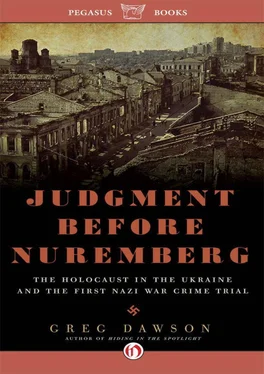Prosecution:Tell us in detail about it.
Ritz:Major Kranebitter took me and several officers and drove out to a village near the town of Kharkov where the shooting was to take place. On the way we overtook three lorries loaded with prisoners accompanied by SS going to the same place. The car in which I rode arrived at a forest clearing where pits had been dug. This clearing was surrounded by SS men. Soon the lorries arrived with the prisoners. The prisoners were divided into small groups and were shot by SS men with automatic rifles. Major Kranebitter said to me: “Show us what you are made of.” As a military man and an officer I did not refuse. I took the automatic rifle from one of the SS men and fired at the prisoners.
Prosecution:Were there women and children among the people shot?
Ritz:Yes. I remember a woman with a child. The woman, trying to save the child, covered it with her body. But this did not help her because the bullet went through her and the child.
Prosecution:How many people were shot on that occasion in your presence?
Ritz:Major Kranebitter told me about three hundred people were to be shot on that day.
Prosecution:In the pits in which people were buried, did you see any who had been asphyxiated in the gas vans?
Ritz:Yes. Lt. Jacobi showed a pit covered with a thin layer of earth through which showed the outlines of human bodies. Lt. Jacobi said these were the passengers of yesterday’s ride in the gas van.
Later in his testimony, Ritz told of moving from observer of massacres to supervisor and trigger man.
Prosecution:Did you personally take part in the shootings in the pits in the vicinity of Taganrog?
Ritz:I was ordered by the Chief of the Sonderkommando, Ecker, to detail a firing squad. After giving my orders, I went to the site to check up whether my instructions had been accurately carried out.
Prosecution:What did you see on the spot?
Ritz:I saw a pit approximately 50 by 50 meters and 4 meters deep. Inside it were a group of persons to be shot, approximately fifty. Sergeant-major Turkel reported that everything was ready for the shooting. The prisoners were poorly clad and had been beaten up. I said “Begin” and fire was opened. A mass of bloodstained bodies piled up in the pit, but some were not dead. I ordered two privates to go down into the pit and finish off those who were still alive. Soon after that, two SS men and I got into the pit. Two persons who were still alive but wounded, I finished off with my pistol.
Ritz’s eagerness to learn new things and techniques was evident throughout his testimony:
Prosecution:Tell us how you questioned Soviet citizens.
Ritz:At first, I questioned the prisoners according to my knowledge of jurisprudence. However, soon the Chief of the Sonderkommando came to me and declared that I could not continue in this way, that these people were thick-skinned and other methods ought to be applied. Then I started beating them.
Prosecution:Was beating part of the system of interrogation of Soviet citizens?
Ritz:Yes. In Kharkov, I had the opportunity of being present at interrogations, and everyone from the commander to the lowest ranks of the Sonderkommando beat up people and beat them hard.
Prosecution:You, Ritz, are a person of higher legal education and apparently consider yourself a man of culture. How could you not only watch people being beaten but even take an active part in it, and shoot perfectly innocent people—not only under compulsion but of your own free will?
Ritz:I had to obey orders, otherwise I would have been court-martialed and certainly sentenced to death.
Prosecution:This is not quite so, because you yourself expressed a desire to be present when people were loaded on to the gas vans and nobody specially invited you to be there.
Ritz:Yes, that is true. But I beg you to take into consideration that I was then still a newcomer on the Eastern Front and wanted to convince myself as to whether it was true these lorries of which I had heard were used on the Eastern Front
Prosecution:Now, Ritz, you are a man with some knowledge of the law. Tell us, were the standards of international law observed to any extent by the German Army on the Eastern Front?
Ritz:I must say that on the Eastern Front there was no question of international law or any other law.
Prosecution:Who is actually to blame for all of this?
Ritz:I consider the primary and chief culprit to be Hitler, who calls first of all for a system of cruelty and, secondly, speaks of the superiority of the Germano-Aryan race whose mission it is to establish order in Europe. Further, I would like to point out that Himmler stated repeatedly that… the death sentence must be imposed according to one’s Aryan instinct. This Germano-Aryan instinct had to be covered up to a certain extent in Germany, but on the Eastern Front the German troops acted openly. Further, I want to speak about Rosenberg, the propagandist of the superiority of the German race. This propaganda of Russians as barbarians caused the German soldiers to behave as they do.
In freely admitting crimes he committed by his own hand, then easily shifting blame to others, Ritz was in many ways the poster boy of the homicidal psychopathy which made the Holocaust possible. Wrote journalist Alexei Tolstoy: “So much for university, music lessons, and a professor’s family—all bounced off Hans Ritz’s conscience like peas off a wall. I declare I have never yet seen such moral degradation.”
Of the three German defendants, Reinhard Retzlaff came closest to personifying the “banality of evil” which Hannah Arendt memorably attached to Adolf Eichmann. Unlike the heel-clicking soldier Langheld and the eager Hitler Youth Ritz, Retzlaff seemed to have drifted on a sea of his own inertia and ineffectuality as a radio operator and prison guard until washing up on the shore of the Eastern front, where he found himself supervising massacres as a Senior Corporal in the German Secret Field Police.
Retzlaff, 36, was born in 1907 in Berlin and had a secondary education. His father worked in a health insurance bureau, and before the war Retzlaff himself was an assistant department head in a Frankfurt newspaper. He joined the German army in 1940 and served as a radio operator with an artillery unit in France. After the French campaign he was assigned to a reservist battalion whose main responsibility was guarding French and Belgian prisoners in Pomerania. Deemed no longer fit for active military duty, Retzlaff then was transferred to the “Altenburg” Battalion, which trained officials for the German Secret Field Police.
A Time story described Retzlaff as “weak-chinned and pompadoured,” his demeanor during trial “bored, contemptuous.”
Prosecution:What subjects were studied in the Altenburg Battalion?
Retzlaff:Chiefly, criminal law, methods of examination, arrests, searches, espionage activities among the civilian population. In addition, special lectures were given us.
Prosecution:What kind of lectures?
Retzlaff:Leading Gestapo officials gave us special reports explaining the mission of the German people as a representative of a superior race and its tasks in the establishment of a “New Order” in Europe and measures related to it.
Prosecution:What are these measures?
Читать дальше












